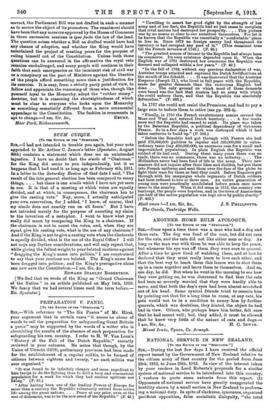SUUM CUIQUE.
[TO TEN EDITOR or THE "SPECTATOR."] SIR,—I had not intended to trouble you again, but your note appended to Mr. Arthur C. James's letter (Spectator, August 30th) contains a statement which does me an unintended injustice. I have no doubt that the simile of " Chairman " for the King did occur to you independently, but it so happens that I had used it as long ago as February 4th, 1911. In a letter to the Saturday Review of that date I said, "The result of the late general election has been compared to many things, . . . but there is one simile which I have not yet seen in use. It is that of a meeting at which votes are equally divided, and at which, in consequence, the chairman has to give the casting vote." Nay, more, I actually anticipated your own reservation, for I added, "I know, of course, that my simile does not exactly run on all fours." But I have not intruded merely for the purpose of asserting my claim to the invention of a metaphor. I want to know what you really did mean by comparing the King to a chairman. If the chairman is not to count the votes, and, when they are equal, give his casting vote, what is the use of any chairman ? And if the King is not to give a casting vote when the electorate is equally divided, what is the use of the Royal Office? I will not urge any further considerations, and will only repeat that, while giving the fullest weight to your belated cautions against "dragging the King's name into politics," I am constrained to say that your cautions are belated. The King's name has been dragged into politics ; and the King's prerogative alone can now save the Constitution.—I am, Sir, &c.,
EDWARD STANLEY ROBERTSON.
[We find that we wrote of the King as "Grand Chairman of the Nation" in an article published on May 14th, 1910. We fancy that we had several times used the term before.— ED. Spectator.]






































 Previous page
Previous page